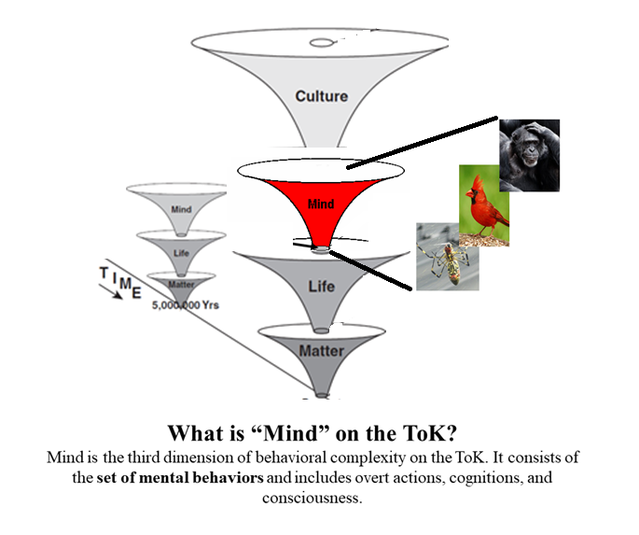Freudian Psychology
We Need a New Definition for Mind
Mind is the third dimension of existence, above Life and beneath Culture.
Posted May 13, 2019
My dog is barking at the UPS man who is coming up our driveway. My glow fish are swimming around in the tank across the room. A small gnat or fly is perched on the plant beside me on my desk and appears to be cleaning its wings. These actions are readily characterized as animal behaviors. You might be interested to know that I see them as clear examples of “Mind”.
At first glance, you would likely question that meaning. In the Western Intellectual Tradition, “the mind” generally refers to something very different. Made famous by Rene Descartes’ dualism between mind and matter, mind often refers to the self-conscious reflections of human beings (recall his famous dictum of the mind, "I think, therefore I am"). Thus, my writing this blog and making the argument for a redefinition of mind is an example of mind in Descartes' sense of the word. But the gnat-like bug cleaning its wings, the glow fish swimming in the tank, and my dog barking at the knock at my door are most definitely not.
To understand my argument, we must recognize how much the word “mind” has changed much since Rene Descartes’ time. Consider, for example, that Descartes came long before Freud shared his insights on the unconscious mind. It was Freud who made the case so clearly that we needed to differentiate between self-consciousness on the one hand and unconscious mental processes on the other. Following Freud, it became clear we could and should differentiate the mental from the conscious.
Descartes was also before the time of behaviorism when first Waston and then Skinner developed elaborate systems of analyzing and experimenting on the observational patterns of animals in terms of behavior. We can all easily agree that the bug cleaning its wings, the fish swimming in the tank, and my dog barking are examples of animal behavior.
Descartes was also long before the time of artificial intelligence and cognitive neuroscience. As the famed cognitive psychologist, Steven Pinker, “the mind is what the brain does”. According to the computational theory of mind (which Pinker supports), what the brain does is process information that allow us to solve adaptive problems.
But how do we actually solve problems in the real world? We behave, of course. Our brain computes stuff and coordinates our muscle movements, allowing us to move toward the good and away from the bad. My dog’s brain computes sounds indicative of possible intruders; my fish's brains move them toward potential flecks of food; the bug brain coordinates how it works toward cleaner wings.
Framed this way, we come back to the behaviorists. B. F. Skinner put the issue as follows: Cognitive psychologists like to say that “the mind is what the brain does,” but surely the rest of the body plays a part. The mind is what the body does…In other words, it is behavior, and that is what behaviorists have been saying for more than half a century.
The Tree of Knowledge language system shines a light on making sense of all of this and does so in a way that defines psychology's subject matter and bridges the gap between the mentalists and radical behaviorists. It argues that there are four distinguishable dimensions of existence, called Matter, Life, Mind, and Culture. Mind, then, is a dimension of existence. Larry Cahoone calls these dimensions of existence “orders of nature,” and he identifies the “mental order of nature” just as the ToK does, as existing “above” the Life order of nature and below the Cultural order.

Put all this together and a new definition of Mind emerges. When capitalized, Mind is the third dimension of existence. It is made up of the set of mental behaviors, which are the behaviors of animals, mediated by the nervous system. Consistent with the analysis offered by the information philosopher Bob Doyle, we can state that “the mind” refers to the information instantiated within and processed by the nervous system. Sentience, the capacity for mental experience, emerges (somehow) out of the flow of neuronal information. All of this documents that we need to separate out human consciousness from the meaning of Mind. Mind is about the animal. Human consciousness is about persons existing in the Cultural Dimension. That is a different dimension of existence on the ToK. By embracing the equivalence of the animal and the mental, we will open ourselves up to a much deeper appreciation of our emotional and bodily natures.


